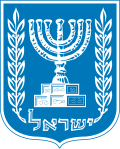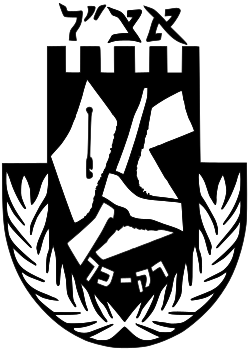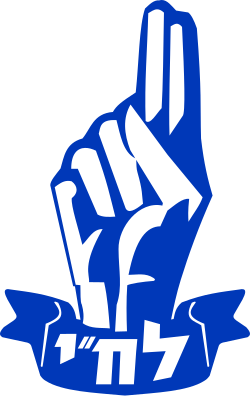Far-right politics in Israel
| Part of a series on the |
 |
|---|
|
|
Far-right politics in Israel encompasses ideologies such as
Mandatory Palestine (1920–1948)

Revisionist Zionism
Revisionist Zionism's ideological and cultural roots were influenced by Italian fascism. Ze'ev Jabotinsky, the founder of Revisionist Zionism, believed that Britain could no longer be trusted to advance Zionism, and that Fascist Italy, as a growing political challenger to Britain, was therefore an ally.[3][4]
Betar (founded 1925)

In 1923,
Revisionist Maximalism

In 1930, Brit HaBirionim under Ahimeir's leadership publicly declared their desire to form a
The goal of the Maximalists was to "extract Revisionism from its liberal entrapment", because they wanted Ze'ev Jabotinsky's status to be elevated to the status of a dictator,[19] and desired to forcably assimilate the population of Palestine into Hebrew society.[15] The Maximalists believed that authoritarianism and national solidarity was necessary to have the public collaborate with the government, and to create total unity in Palestine.[15]
Irgun (1931–1949)


The
The Irgun policy was based on what was then called
The organization committed acts of terrorism against Palestinian Arabs, as well as against the British authorities, who were regarded as illegal occupiers.
The White Paper of 1939
The White Paper's publication also intensified the conflict between the Zionist militias and the British Army; a Jewish general strike was called, attacks were launched against Arabs and British police, telephone services and power lines were sabotaged, and violent speeches of protest were held for several months.[35] A week after the publication of the White Paper of 1939, the Irgun planted an explosive device in the Rex cinema in Jerusalem, injuring 18 people, including 13 Arabs and 3 British police officers. On that same day, 25 Irgun members attacked the Arab village Biyar 'Adas, forced their way into 2 houses, and shot 5 Arab civilians to death.[36]
Lehi (founded 1940)

The
History in Israel
After the 1967 Six-Day War
In the aftermath of the 1967 Six-Day War, Israel captured the Golan Heights, the West Bank, the Sinai Peninsula, and the Egyptian-occupied Gaza Strip.[42] This victory resulted in the revival of "territorial maximalism", with aspirations to annex and settle these new territories.[43] leading some Israeli political leaders to argue for the redefinition of the country's borders in accordance with the vision of Greater Israel.[44] The Movement for Greater Israel, which emerged about a month after the Six-Day War ended, advocated for the control over all of the territories captured during the war, including the Sinai Peninsula, West Bank, and Golan Heights. The members of the movement demanded immediate imposition of Israeli sovereignty over the territories. The supporters of the movement were united by a territorial maximalist ideology.[44] During the summer of 1967, far-right nationalists began to establish settlements in the occupied West Bank to establish a Jewish presence on the land.[45] Menachem Begin's agreement to return the Sinai Peninsula to Egypt, as well as his initiation of the Autonomy Plan, caused parts of the political right to radicalise and adopt far-right political ideologies.[46]
Kach party (1971–1994)
The
Shortly after Meir Kahane was sworn in as a member of the Knesset, he made his first media-oriented provocation by announcing his plan to open an emigration office in the Arab village of Umm al-Fahm. He stated that his plan was to offer residents of the village financial incentives to leave their homes and the country.[54] The town declared a general strike shortly after, and roughly 30,000 people, including liberal Jews, arrived at Umm-al-Fahm to prevent Kahane from entering the town. The Israel Police initially decided to accompany Kahane with 1000 police officers as he marched, but later decided to cancel Kahane's march altogether, in concern of negative consequences.[55]
Kach activists frequently entered Arab localities in Israel, distributing propaganda leaflets in demonstrations, provocatively raising the Israeli flag, making Arabs sign the Israeli Declaration of Independence, threatening them against moving to majority-Jewish towns, and convincing Arabs to leave the country.[56] Some of Meir Kahane's legislative initiatives were mostly related to the "Arab problem" in Israel, intending to separate Jews and Arabs in public swimming pools, banning romantic relations between Jews and Arabs, and revoking the citizenship of Arabs in Israel.[57] In his book, "They Must Go", Kahane wrote: "There is only one path for us to take: the immediate transfer of Arabs from Eretz Yisrael. For Arabs and Jews in Eretz Yisrael there is only one answer: separation, Jews in their land, Arabs in theirs. Separation. Only separation."[58]
One bill which he proposed required the imposition of a
The Oslo Accords and the 1995 assassination of Yitzhak Rabin

The far-right in Israel opposed the
2005 Israeli disengagement from Gaza

The Israeli disengagement from Gaza, headed by Ariel Sharon, included the removal of all Jewish settlements in the Gaza Strip as well as several West Bank settlements, and resulted in protests and riots from Jewish settlers.[72][73][74] Posters covering the streets stated that "Ariel Sharon had no right to give up parts of the Land of Israel". The settlers managed to secure the support of Ovadia Yosef, then-leader of Shas party, who instructed Shas members of the Knesset to vote against the disengagement plan.[75][76] Three settlers burned themselves alive in protest of the disengagement.[77][78][79] By September 12, 2005, the eviction of all settlers from the Gaza Strip and demolition of their houses was completed,[80][81] bringing Israel's 38 years of military rule over the Gaza Strip to a halt.
Political parties in 21st century
Moledet (1988–2013)
Moledet (
Religious Zionist Party (1998–2023)
| This article is part of a series on |
| Conservatism in Israel |
|---|
 |
Otzma Yehudit (founded 2012)
Noam (founded 2019)
2020s
2022 Likud-led coalition
The 37th Cabinet of Israel, formed on December 29, 2022, following the Knesset election on November 1, 2022, has been described as the most right-wing government in Israeli history,[97][98][99][100] as well as Israel's most religious government.[101][102] The coalition government consists of seven parties—Likud, United Torah Judaism, Shas, Religious Zionist Party, Otzma Yehudit, Noam, and National Unity—and is led by Benjamin Netanyahu.[103]
Criticism
Several journalists and human rights groups such as B'Tselem, Amnesty International, and Human Rights Watch claim that the ideology advocated by the Israeli far-right are fascist and racist towards Palestinians, Arab citizens of Israel and immigrants. They see it as a danger to democracy, and claim that it uses violence and encourages violation of human rights.[104][105][106][107] President of the United States Joe Biden said Benjamin Netanyahu's government contained "some of the most extreme" members he had ever seen.[108]
In 2023, the
Far-right Israeli politicians and the Al Aqsa Mosque
The
In 2023 and 2024, National Security Minister
February 2023 Huwara rampage

On 26 February 2023, in retaliation for the
Israeli soldiers were in the area while the rampage by the settlers unfolded and did not intervene.[114] The rampage was called a pogrom by an Israeli commander in charge of the area.[118]
Israeli and Palestinian officials issued a joint declaration in Aqaba, Jordan to counter the recent round of Israeli–Palestinian violence.[115][116][119]
Smotrich's call for Huwara to be "wiped out"
In the rampage's aftermath, Israeli Finance Minister Bezalel Smotrich, a far-right politician partly in charge of the administration of the West Bank,[120] called for Huwara to be "wiped out" by the Israeli army.[121][122] Condemnations from the United States, European Union, and Arab countries led to Smotrich retracting his comments and claiming they were said in the heat of the moment.[118][123]
Gaza war
Statements from far-right ministers
Israel's far-right ministers have made controversial comments during the Gaza war.
- Agriculture Minister Avi Dichter (Likud) told Israeli Channel 12 in November 2023 that the war would be "Gaza's Nakba", using the Arabic word for "catastrophe" that many use to describe the 1948 displacement of roughly 700,000 Palestinians.[124][125]
- Heritage Minister Amihai Eliyahu (Otzma Yehudit) said in an interview in November 2023 that dropping a nuclear bomb on the Gaza Strip was "one of the possibilities".[126][127]
- Finance Minister Bezalel Smotrich (National Religious Party–Religious Zionism) said in a November 2023 letter that Palestinians should be excluded from "security zones" in the occupied West Bank even to "harvest olives". He has also called for the creation of "sterile security zones" around settlements in the West Bank to "prevent Arabs from entering".[128][129]
- Minister for the Advancement of Women May Golan (Likud) said in a speech in February 2024 "I am personally proud of the ruins of Gaza, and that every baby, even 80 years from now, will tell their grandchildren what the Jews did."[130]
General strategy and courses of action
The far-right in Israel have used a variety of ways over the years to achieve their political goals. These include far-right parties such as
Notable political figures
See also
Notes
- 1st century AD.
References
- ISBN 9780429034404.
- ISBN 978-0-415-77597-7.
- ISBN 978-0-299-20380-1.
- JSTOR 2536926.
- ^ a b "Part One: What the Netanyahu Family Did to Palestine". Spotify.
- .
- YIVO Encyclopedia of Jews in Eastern Europe
- ^ Ze'ev (Vladimir) Jabotinsky Jewish Virtual Library.
- JSTOR 1396118.
- ^ Leonard Weinberg, Ami Pedahzur, Religious fundamentalism and political extremism, Routledge, p. 101, 2004.
- ^ J. Bowyer Bell, Moshe Arens, Terror out of Zion, p. 39, 1996 edition
- Lehi).
- ^ Ben-Yehuda, Nachman (1993). Political Assassinations by Jews: A Rhetorical Device for Justice. Albany, N.Y.: SUNY Press. p. 204.
- ^ ISBN 978-0-521-63012-2.
- ^ JSTOR 24531975.
- ^ Larsen, p377.
- JSTOR 30245501.
- ISBN 0-88033-988-8. pp. 364–365.
- JSTOR 30245655.
- ISBN 978-0-7146-3325-1
- ISBN 978-3-638-94450-2. No 33 of 5708-1948 – 23 September 1948
- ISBN 978-0-906187-11-1.
- ISBN 978-0415687317.
- ISBN 145226550X.
- ^ Howard Sachar: A History of Israel: From the Rise of Zionism to Our Time, pp. 265–266
- ^ "Irgun Zvai Leumi | Jewish right-wing underground movement". Encyclopædia Britannica. Retrieved January 2, 2016.
- ^ Pope Brewer, Sam. Irgun Bomb Kills 11 Arabs, 2 Britons. New York Times. December 30, 1947.
- ^ Irgun's Hand Seen in Alps Rail Blast. New York Times. August 16, 1947.
- ^ W. Khalidi, 1971, 'From Haven to Conquest', p. 598
- ^ Terry, Janice (2008). Encyclopedia of world history Vol 5 pg 20. Infobase Publishing.
- ^ "Jewish Terrorism and Jewish Resistance". The Jewish Plan for Palestine—Memoranda and Statements presented by The Jewish Agency for Palestine to the United Nations Special Committee on Palestine. The Jewish Agency for Palestine, Jerusalem. 1947. pp. 20–26.
- ^ "Major Political Developments". The Jewish Plan for Palestine—Memoranda and Statements presented by The Jewish Agency for Palestine to the United Nations Special Committee on Palestine. The Jewish Agency for Palestine, Jerusalem. 1947. p. 32.
- ISBN 9780691120942.
- ISBN 0-297-78423-4.
One of the main developments in the initial period of the State was the growth of the Herut party.... It developed from the older Revisionist groups, the 'terrorist' groups of the Irgun Zvai Leumi and members of the Revisionist party ... in 1965 Herut founded, together with the great part of the Liberals, a parliamentary bloc ... in 1973, with the addition of other small groups, it became transformed into Likud
- ISBN 978-0-88728-211-9.
- ^ "Eighteen Injured by Bombs in Jerusalem Cinema House. 3 Britons, 13 Arabs, 2 Jews in Hospital. Jewish Cinemas Ordered Closed Indefinitely". The Palestine Post. May 30, 1939. p. 1. Retrieved April 17, 2024 – via The National Library of Israel.
- ^ "סמל לח״י". Archived from the original on May 18, 2020. Retrieved September 12, 2019.
- ^ Leslie Stein,The Hope Fulfilled: The Rise of Modern Israel, Greenwood Publishing Group 2003 pp. 237–238.
- ^ Stein, Leslie (2003). The hope fulfilled : the rise of modern Israel. Westport, Conn. USA: Praeger. Archived from the original on September 17, 2013. Retrieved May 22, 2024.
Donor: Boston Public Library
- ISBN 9781135966492.
- ISBN 978-1-86064-774-1.
- ^ "Milestones: 1961–1968". Office of the Historian. Archived from the original on October 23, 2018. Retrieved November 30, 2018.
Between June 5 and June 10, Israel defeated Egypt, Jordan, and Syria and occupied the Sinai Peninsula, the Gaza Strip, the West Bank, East Jerusalem, and the Golan Heights
- ISBN 978-0-19-505086-8.
- ^ ISBN 978-0-19-974470-1.
- ^ ISBN 0-312-43736-6, pp. 458
- JSTOR 422043.
- ISBN 978-1-4129-8016-6.
- ^ ISBN 9781135966423.
- ISBN 978-0818404382.
The Jew is forbidden to give up any part of the Land of Israel, which has been liberated. The land belongs to the G-d of Israel, and the Jew, given it by G-d, has no right to give away any part of it. All the areas liberated in 1967 will be annexed and made part of the State of Israel. Jewish settlement in every part of the land, including cities that today are sadly Judenrein, will be unlimited.
- ISBN 9781317605447.
- ISBN 978-0-415-26871-4.
- JSTOR 1964231.
- ^ "Parliamentary Groups in the Knesset". August 15, 2014. Archived from the original on August 15, 2014. Retrieved March 23, 2024.
- SSRN 304568 – via Social Science Research Network.
- ISBN 978-1-138-06355-6.
- ISBN 978-0-8133-0756-5.
- ISBN 978-0-8130-1258-2.
- ISBN 978-0-448-12026-3.
- JSTOR j.ctt155j609.
- ^ ISBN 978-1-83910-020-8.
- ^ "בחירות 1984". Israel Democracy Institute (in Hebrew). Retrieved May 17, 2024.
- JSTOR 45242597.
- ^ Lewis, Neil (October 18, 2006). "Appeals Court Upholds Terrorist Label for a Jewish Group". The New York Times.
- ISBN 0-399-14217-7.
- ISBN 978-1-61-069285-4.
- ISBN 978-1-31-550823-8.
- ISBN 978-0-393-24209-6.
- ISSN 2380-0992.
- ISBN 978-1-4384-6839-6.
- ^ Ex-Undercover Agent Charged as a Link in Rabin Killing, The New York Times, April 26, 1999
- ISBN 978-0-415-35758-6.
- ISBN 978-1-4422-5169-4.
4 August: Security forces prevent thousands of Israeli protesters from marching into Gaza settlements
- ^ "Thousands protest Israel's Gaza withdrawal". NBC News. June 27, 2005. Retrieved April 5, 2024.
- ^ Lis, Jonathan (January 25, 2010). "Israel to expunge criminal records of 400 Gaza pullout opponents". Haaretz. Retrieved April 5, 2024.
- OCLC 166379384.
- )
- ^ "מת גבר ששרף עצמו בגלל הפינוי" [Man who set himself on fire in protest of the disengagement – pronounced dead]. Makor Rishon. Retrieved April 13, 2024.
- ^ Hasson, Nir (August 18, 2005). "מפגינת ימין הציתה עצמה; מצבה קשה". הארץ (in Hebrew). Retrieved April 13, 2024.
- ^ וייס, אפרת (September 6, 2005). "מת מפצעיו הצעיר שהצית עצמו בגלל ההתנתקות". Ynet (in Hebrew). Retrieved February 16, 2024.
- JSTOR 20202970.
- Ynetnews. September 1, 2005. Retrieved May 5, 2007.
- ^ Moledet Israeli Democracy Institute
- ^ Meranda, Amnon (November 3, 2015). "Right-wing parties unite". Ynetnews. Retrieved November 3, 2008.
- ^ "Moledet Strengthens Unity in Religious Camp". Arutz Sheva. November 8, 2012. Retrieved December 4, 2012.
- ^ "Tkuma (Revival: The First 50 Years) 22 Chapters". Amazon.com.
- ^ "הציונות הדתית בראשות בצלאל סמוטריץ'". Central Election Committee for the Knesset.
- ^ S2CID 256106816.
... a political backlash that helped a militantly anti-Arab, far-right Religious Zionist Party to become the third-largest faction ...
- ^ from the original on November 8, 2022. Retrieved May 9, 2023.
- ^ Hoffman, Gil (January 7, 2021). "'Post' poll shows mergers capable of bringing down Netanyahu". The Jerusalem Post. Retrieved January 21, 2021.
- ^ "Religious Zionism and Jewish Home parties merge". Israel National News. August 3, 2023. Retrieved September 22, 2023.
- ^ "Itamar Ben-Gvir: Israeli far-right leader set to join new coalition". BBC News. November 25, 2022. Retrieved March 23, 2024.
- ^ "UK sanctions extremist groups and individuals for settler violence in the West Bank". GOV.UK. Retrieved May 3, 2024.
- ^ "US sanctions Lehava leader, fundraisers for violent settlers". The Jerusalem Post. April 19, 2024. Retrieved May 3, 2024.
- ^ Sharon, Jeremy (July 17, 2019). "Anti-LGBT Noam Party set to run in September election". The Jerusalem Post. Retrieved November 8, 2022.
- ^ "אודות אבי מעוז". Noam (in Hebrew). Retrieved January 5, 2023.
- ^ "חברי הכנסת ה-25 לפי סיעות" (in Hebrew). Knesset. Retrieved January 5, 2023.
- from the original on November 11, 2022. Retrieved November 6, 2022.
- Reich, Eleanor H. (November 16, 2022). "Israel swears in new parliament, most right-wing in history". Associated Press. Archived from the original on December 7, 2022. Retrieved December 22, 2022.
- Shalev, Tal (February 3, 2023). "The most right-wing coalition in Israel's history had a stormy first month". The Jerusalem Post. Archived from the original on March 11, 2023. Retrieved March 11, 2023.
- ^ * "Israel Swears in New Parliament, Most Right-Wing in History". U.S. News & World Report. Associated Press (AP). 2022. Archived from the original on March 11, 2023. Retrieved March 11, 2023.
Israel has sworn in its most religious and right-wing parliament
- Lieber, Dov; Raice, Shayndi; Boxerman, Aaron (2022). "Behind Benjamin Netanyahu's Win in Israel: The Rise of Religious Zionism". The Wall Street Journal. Archived from the original on March 11, 2023. Retrieved March 11, 2023.
Israel's most right-wing and religious government in its history
- "Netanyahu Government: West Bank Settlements Top Priority". VOA. Associated Press (AP). 2022. Archived from the original on March 11, 2023. Retrieved March 11, 2023.
the most religious and hardline in Israel's history
- Lieber, Dov; Raice, Shayndi; Boxerman, Aaron (2022). "Behind Benjamin Netanyahu's Win in Israel: The Rise of Religious Zionism". The Wall Street Journal. Archived from the original on March 11, 2023. Retrieved March 11, 2023.
- ^ Carrie Keller-Lynn (December 21, 2022). ""I've done it": Netanyahu announces his 6th government, Israel's most hardline ever". The Times of Israel. Archived from the original on January 14, 2023. Retrieved December 21, 2022.
- ^ Picheta, Rob; Gold, Hadas; Tal, Amir (December 29, 2022). "Benjamin Netanyahu sworn in as leader of Israel's likely most right-wing government ever". CNN. Archived from the original on February 28, 2023. Retrieved December 29, 2022.
- ^ * Maltz, Judy (November 3, 2022). "Will Israel Become a Theocracy? Religious Parties Are Election's Biggest Winners". Haaretz. Archived from the original on November 7, 2022. Retrieved November 6, 2022.
- Levinthal, Batya (January 4, 2023). "Poll: 70% of secular Israelis worry about their future under new gov". i24News. Archivedfrom the original on March 11, 2023. Retrieved March 11, 2023.
Netanyahu's new government, deemed the most religious and right-wing in the country's history.
- Levinthal, Batya (January 4, 2023). "Poll: 70% of secular Israelis worry about their future under new gov".
- ^ Gross, Judah Ari (November 4, 2022). "Israel poised to have its most religious government; experts say no theocracy yet". The Times of Israel. Archived from the original on November 6, 2022. Retrieved November 6, 2022.
- ^ "Elections and Parties". en.idi.org.il. Retrieved March 23, 2024.
- ^ Guyer, Jonathan (January 20, 2023). "Israel's new right-wing government is even more extreme than protests would have you think". Vox. Retrieved March 22, 2024.
- ^ Shakir, Omar (April 27, 2021). "A Threshold Crossed". Human Rights Watch.
- ^ "Who is Israel's far-right, pro-settler Security Minister Ben-Gvir?". Al Jazeera. Retrieved March 22, 2024.
- ISSN 0261-3077. Retrieved March 22, 2024.
- ^ Gritten, David (July 10, 2023). "Biden criticises 'most extreme' ministers in Israeli government". BBC News. Retrieved March 23, 2024.
- ^ Klein, Yossi (January 12, 2023). "Netanyahu's Stalinist purge threatens Israeli democracy". Haaretz.
- ^ a b Najjar, Farah; Harb, Ali (July 27, 2023). "Israeli far-right minister leads incursion of Al-Aqsa compound". Al Jazeera. Retrieved May 17, 2024.
- ^ Toi Staff; Magid, Jacob (May 22, 2023). "US flogs Ben Gvir for 'provocative, inflammatory' tour on tense Temple Mount". The Times of Israel.
- ^ Gritten, David (February 27, 2023). "Settlers rampage in West Bank villages after Israelis killed". BBC News. Retrieved February 27, 2022.
- ^ a b Kingsley, Patrick; Kershner, Isabel (February 27, 2023). "Revenge Attacks After Killing of Israeli Settlers Leave West Bank in Turmoil". The New York Times. Retrieved March 5, 2023.
- ^ a b Breiner, Josh (February 28, 2023). "The Chaos in Hawara Didn't End on the Night of the Riots, nor Did the Israeli Army's Incompetence". Haaretz. Retrieved February 28, 2023.
- ^ a b McKernan, Bethan (February 27, 2023). "Israeli settlers rampage after Palestinian gunman kills two". The Guardian. Retrieved February 27, 2023.
- ^ a b Mohammed, Majdi; Ben Zion, Ilan (February 27, 2023). "Israel beefs up troops after unprecedented settler rampage". Associated Press. Retrieved February 27, 2023.
- ^ Bateman, Tom (February 27, 2023). "Hawara: 'What happened was horrific and barbaric'". BBC News. Retrieved February 28, 2023.
- ^ a b Scharf, Isaac; Bentov, Ami (March 2, 2023). "Israeli campaign raises funds for torched Palestinian town". Associated Press News. Retrieved October 14, 2023.
- ^ McKernan, Bethan (February 26, 2023). "Israeli and Palestinian officials express 'readiness' to work to stop violence". The Guardian. Retrieved February 27, 2023.
- ^ Rubin, Shira (February 28, 2023). "Emboldened by Israel's far right, Jewish settlers fan the flames of chaos". The Washington Post. Retrieved March 5, 2023.
- ^ Maanit, Chen; Samuels, Ben (March 1, 2023). "Palestinian 'Village of Hawara Needs to Be Wiped Out': Israel's Far-right Finance Minister Justifies 'Disproportionate' Response to Terrorism". Haaretz. Retrieved March 1, 2023.
- ^ Magid, Jacob (March 2, 2023). "US prods Netanyahu to condemn Smotrich 'incitement' after call to wipe out Huwara". The Times of Israel. Retrieved March 5, 2023.
- ^ Magid, Jacob (March 3, 2023). "Smotrich's DC visit still on amid uproar, but US officials not planning to meet him". The Times of Israel. Retrieved March 6, 2023.
- ^ Tov, Michael Hauser (November 12, 2023). "'We're rolling out Nakba 2023,' Israeli minister says on northern Gaza Strip evacuation". Haaretz. Retrieved March 23, 2024.
- ^ Da Silva, Chantal (November 14, 2023). "Israel right-wing ministers' comments add fuel to Palestinian fears". NBC News. Retrieved March 23, 2024.
- ^ Lederer, Edith M. (November 14, 2023). "China, Iran, Arab nations condemn Israeli minister's statement about dropping a nuclear bomb on Gaza". Associated Press. Retrieved March 23, 2024.
- ^ Staff Reporter. "Extremist Israeli minister renews call to hit Gaza with 'nuclear bomb'". TRT World. Retrieved March 23, 2024.
- ^ "Far-right minister Smotrich calls for 'sterile zones' free of Palestinians near settlements". Middle East Eye. Retrieved March 23, 2024.
- ISSN 0261-3077. Retrieved March 23, 2024.
- ^ Bhat, Sadiq. "'Proud of ruins of Gaza': Israeli minister rejoices at Palestine's distress". TRT World. Retrieved March 23, 2024.
- ISBN 978-1-317-58450-6.
- ^ Pietromarchi, Virginia; Haddad, Mohammed. "How Israeli settlers are expanding illegal outposts amid Gaza war". Al Jazeera. Retrieved March 22, 2024.
- ^ Magid, Jacob (July 23, 2017). "Work starts on new outpost outside Halamish after deadly terror attack". The Times of Israel. Archived from the original on July 23, 2017. Retrieved July 23, 2017.
- ^ "Hilltop Youth push to settle West Bank". August 18, 2009. Retrieved March 31, 2024.
- ISBN 978-0-231-15446-8.)
{{cite book}}: CS1 maint: publisher location (link - ^ Burgess, Mark (May 20, 2004). "Explaining Religious Terrorism Part 1". studies.agentura.ru. Retrieved March 22, 2024.
- ^ Gavlak, Dale (May 13, 2014). "'Price Tag' Israeli Extremists Target Christians". Christianity Today. Retrieved March 15, 2019.
- ^ Yifa Yaakov, 'Arab Israeli complains of Galilee price tag attack,' The Times of Israel 21 April 2014,
- ^ Hasson, Nir (February 10, 2013). "Daughter of slain peace activist Grunzweig: Israel imposes terror on its citizens". Haaretz. Retrieved March 22, 2024.
- ISBN 978-0-399-14217-8.





